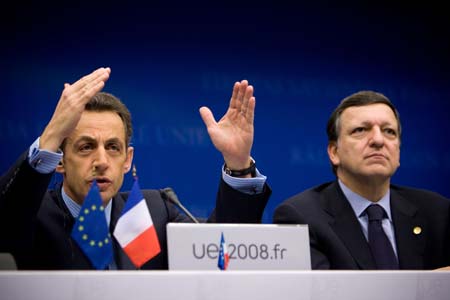 |
|
French President Nicolas Sarkozy (L), whose country holds the EU presidency, attends a press conference with European Commission President Jose Manuel Barroso at the EU headquarters in Brussels, capital of Belgium, Dec. 12, 2008.[Xu Jinquan/Xinhua] |
European Union (EU) leaders wrapped up a two-day summit in Brussels Friday with compromise deals on an economic stimulus package, climate change and the Lisbon Treaty.
"Three major decisions have been taken in unanimity," said French President Nicolas Sarkozy, whose country holds the EU presidency, at a press conference after chairing the meeting with his EU counterparts.
Sarkozy said EU leaders agreed on the need for an economic recovery plan on the basis of the European Commission's proposal.
In a bid to coordinate national efforts within the EU to support a sluggish economy hit by the financial crisis, the Commission proposed in November a EU-wide economic stimulus package worth 200 billion euros (264 billion U.S. dollars).
The sum amounts to 1.5 percent of the EU's gross domestic product, with 1.2 percent coming from EU governments and the rest from EU funding.
But EU heads of state watered down the original proposal by pledging "around" 200 billion euros to the package, instead of "at least."
Germany, the largest economy in the EU, had been opposed to a call for it to expand its national fiscal stimulus plan for the benefit of the EU economy as a whole, saying their current plan worth 32 billion euros (42 billion U.S. dollars) was enough.
However, EU leaders failed to decide on a proposal pushed by France and Britain to cut value-added tax (VAT) on green goods and labor-intensive services such as restaurants, putting off the debate until a meeting of finance ministers in the spring.
An ambitious climate change and energy package proved to be the toughest topic tackled by the EU leaders.
"This is quite historic. You will not find another continent in this world that has given itself such binding rules as we have just adopted," Sarkozy said. "The objectives remain the same."
In March 2007, EU heads of state and government pledged to reduce EU's emissions by 20 percent in 2020 compared to 1990 levels, and to have 20 percent of renewables in total energy consumption and achieve 20 percent energy savings, also by 2020.
This time, they struggled to get the details settled. A deal was possible after concessions were made to Italy, Germany and Poland, among several other central and eastern European members.
Prior to the summit, German Chancellor Angela Merkel had warned against any action that would endanger employment or investment in her country. Italy had also expressed hope that the package would meet its demand to protect its manufacturing industry.
Central and eastern European countries led by Poland and Hungry also requested special treatment since their energy demand relies heavily on more polluting coal.
After hard-fought negotiations, EU leaders agreed to give free emission permits to industries threatened by stricter climate change rules and heavily coal-dependent power plants.
Sarkozy also declared that the stalled ratification process of the Lisbon Treaty will be re-launched, after Ireland agreed to hold a second referendum by the end of October 2009.
"The Irish will be consulted again," he said.
In exchange for Ireland's commitment, EU leaders agreed to take a decision not to trim the European Commission so as to maintain the current "one country, one seat" principle.
Irish voters in June 2008 vetoed the Lisbon Treaty, a key instrument aimed at streamlining EU institutions and decision-making, putting the much-needed reforms on hold.
They were concerned that Ireland might lose its voice in the future European Commission, the executive arm of the EU, since the Lisbon Treaty would see the number of commissioners reduced.
EU leaders will also take measures to relieve other concerns of Irish voters, including Ireland's military neutrality, its opposition to abortion and national rights on taxation, Sarkozy said.
"Europe succeeded in its credibility test," European Commission President Jose Manuel Barroso told the same press conference, describing the summit as one of the most important since he assumed the top EU post.
With the EU taking the lead in the global fight against climate change, it is now time for others, especially the United States, to follow suit, Barroso said.
"Our message to our global partners is this -- yes, you can; yes, you can also do what we are doing," he said, citing the famous slogan used by U.S. President-elect Barack Obama in his campaign for the White House.
Sarkozy also urged others to do the same.
"People will not follow Europe unless we set the example," he said.
The EU wanted to set ambitious targets for itself so as to lead global talks on the fight against climate change at an international summit in Copenhagen next year.
On the first day of the EU summit, when negotiations were deadlocked, UN Secretary General Ban Ki-moon called on the bloc to show leadership.
"What we need today is leadership," Ban said on the sidelines of an international climate change meeting in Poznan, Poland.
"We look for leadership from the European Union. The decisions currently being made by European leaders in Brussels are (of) great consequence for the whole world," he said.
(Xinhua News Agency December 13, 2008)